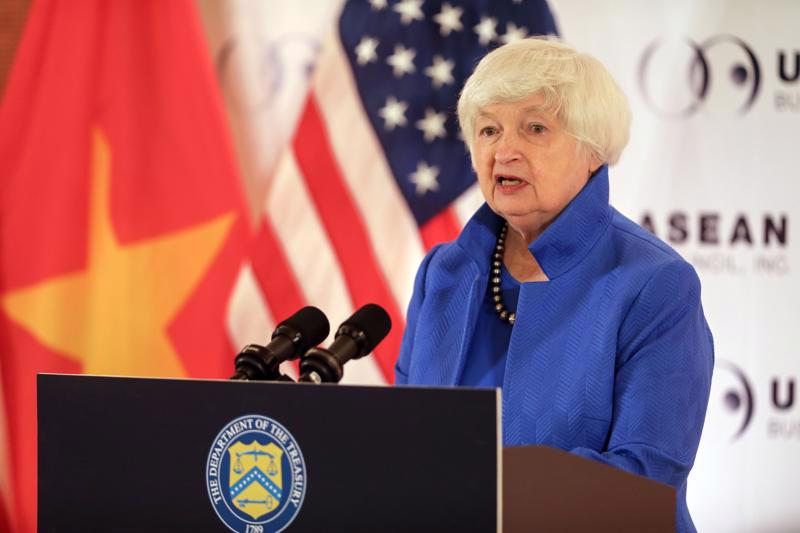Vietnam has emerged as a critical node in the global semiconductor supply chain over the past decade, US Secretary of the Treasury Janet Yellen said in addressing a roundtable with US-ASEAN Business Council (US-ABC) member companies in Hanoi on July 21 as part of her visit to the country.
“And investments are only accelerating,” she said. “Less than an hour’s drive from here in Bac Ninh province, Amkor - an Arizona-based company - will soon open a state-of-the-art mega factory for semiconductor assembly and testing. Down in the southern province of Dong Nai, another American company, Onsemi, produces chips that are used in cars halfway around the world. Nearby, at Saigon Hi-Tech Park, sits the largest Intel assembly and testing facility in the world. Many of the companies investing in Vietnam are also building up their capacity and employment in the US as well.”
Vietnam is now a key player on the global economic stage and plays a critical role in many vital global supply chains, she noted.
“During this trip, I have seen first-hand the dynamism and energy that has propelled your economic development,” she told the gathering. “This undeniable strength will help you achieve your goal of becoming a high-income country by 2045.”
“The US has been your steadfast partner. At the turn of the century, we were proud to sign a robust bilateral trade agreement to expand our economic relationship,” she went on.
“In 2007, Vietnam joined the WTO. Since then, our relationship has only broadened and deepened. Our trade now encompasses everything from machinery to textiles to electronic components. Many of America’s largest companies - like Apple and Google - have a significant and growing presence in Vietnam. For the past two decades, trade between our two countries has grown at nearly 25 per cent a year. That’s an astounding rate. Not only have US imports of Vietnamese goods skyrocketed, but today, the US exports nearly 20 times more to Vietnam than in 2002.”
“There is no sign that this momentum is slowing. Our goods trade reached a record high last year. I believe this strong economic relationship is possible because it is founded on mutual trust.”
More broadly, Vietnam and the US have worked together to bolster resilient supply chains with other countries. The two countries are part of the Indo-Pacific Economic Framework. Two months ago, the Framework’s member countries announced a proposed agreement to strengthen supply chain resilience. Under the agreement, partners would collaborate to build a collective understanding of supply chain vulnerabilities, improve crisis response, and identify opportunities for technical assistance and capacity building. Notably, it also emphasizes the importance of expanding the benefits of these efforts to workers and small businesses, including by promoting worker training and worker rights, according to Mrs. Yellen.
“As we undertake these supply chain efforts, let me be very clear: ‘friendshoring’ is not for an exclusive club of countries,” she said. “It is open and inclusive of advanced economies, emerging markets, and developing countries alike. The US is working to strengthen - not weaken - our ties with the emerging and developing world, as demonstrated by our partnership with Vietnam. That’s why we have launched new initiatives to invest in the development of our partner countries. This includes taking part in the G7’s pledge to mobilize $600 billion in infrastructure investment over the next few years through the Partnership for Global Infrastructure and Investment.”









 Google translate
Google translate